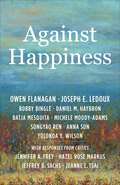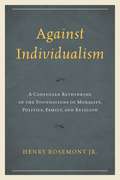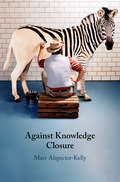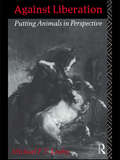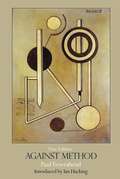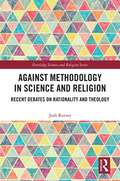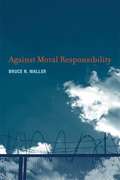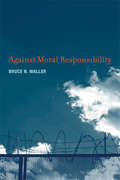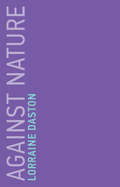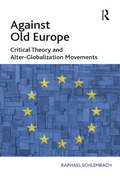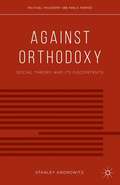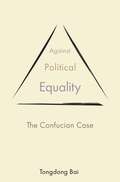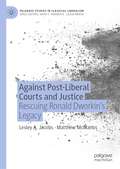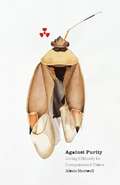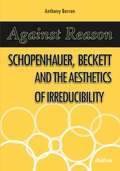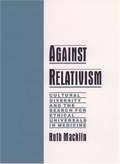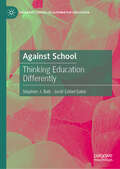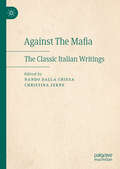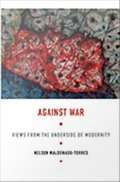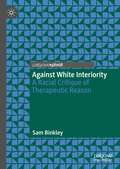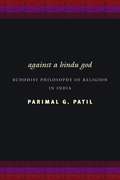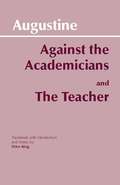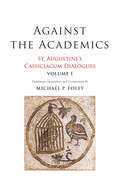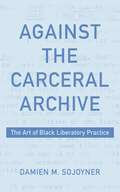- Table View
- List View
Against Happiness
by Owen Flanagan Batja Mesquita Anna Sun Joseph E. LeDoux Daniel M. Haybron Michele Moody-Adams Bobby Bingle Songyao Ren Yolonda Y. WilsonThe “happiness agenda” is a worldwide movement that claims that happiness is the highest good, happiness can be measured, and public policy should promote happiness. Against Happiness is a thorough and powerful critique of this program, revealing the flaws of its concept of happiness and advocating a renewed focus on equality and justice.Written by an interdisciplinary team of authors, this book provides both theoretical and empirical analysis of the limitations of the happiness agenda. The authors emphasize that this movement draws on a parochial, Western-centric philosophical basis and demographic sample. They show that happiness defined as subjective satisfaction or a surplus of positive emotions bears little resemblance to the richer and more nuanced concepts of the good life found in many world traditions. Cross-cultural philosophy, comparative theology, and social and cultural psychology all teach that cultures and subcultures vary in how much value they place on life satisfaction or feeling happy. Furthermore, the ideas promoted by the happiness agenda can compete with rights, justice, sustainability, and equality—and even conceal racial and gender injustice.Against Happiness argues that a better way forward requires integration of cross-cultural philosophical, ethical, and political thought with critical social science. Ultimately, the authors contend, happiness should be a secondary goal—worth pursuing only if it is contingent on the demands of justice.
Against Individualism: A Confucian Rethinking of the Foundations of Morality, Politics, Family, and Religion
by Henry RosemontThe first part of Against Individualism: A Confucian Rethinking of the Foundations of Morality, Politics, Family, and Religion is devoted to showing how and why the vision of human beings as free, independent and autonomous individuals is and always was a mirage that has served liberatory functions in the past, but has now become pernicious for even thinking clearly about, much less achieving social and economic justice, maintaining democracy, or addressing the manifold environmental and other problems facing the world today. In the second and larger part of the book Rosemont proffers a different vision of being human gleaned from the texts of classical Confucianism, namely, that we are first and foremost interrelated and thus interdependent persons whose uniqueness lies in the multiplicity of roles we each live throughout our lives. This leads to an ethics based on those mutual roles in sharp contrast to individualist moralities, but which nevertheless reflect the facts of our everyday lives very well. The book concludes by exploring briefly a number of implications of this vision for thinking differently about politics, family life, justice, and the development of a human-centered authentic religiousness. This book will be of value to all students and scholars of philosophy, political theory, and Religious, Chinese, and Family Studies, as well as everyone interested in the intersection of morality with their everyday and public lives.
Against Knowledge Closure
by Marc Alspector-KellyKnowledge closure is the claim that, if an agent S knows P, recognizes that P implies Q, and believes Q because it is implied by P, then S knows Q. Closure is a pivotal epistemological principle that is widely endorsed by contemporary epistemologists. Against Knowledge Closure is the first book-length treatment of the issue and the most sustained argument for closure failure to date. Unlike most prior arguments for closure failure, Marc Alspector-Kelly's critique of closure does not presuppose any particular epistemological theory; his argument is, instead, intuitively compelling and applicable to a wide variety of epistemological views. His discussion ranges over much of the epistemological landscape, including skepticism, warrant, transmission and transmission failure, fallibilism, sensitivity, safety, evidentialism, reliabilism, contextualism, entitlement, circularity and bootstrapping, justification, and justification closure. As a result, the volume will be of interest to any epistemologist or student of epistemology and related subjects.
Against Liberation: Putting Animals in Perspective
by Michael P. LeahyThe Western world is currently gripped by an obsessive concern for the rights of animals - their uses and abuses. In this book, Leahy argues that this is a movement based upon a series of fundamental misconceptions about the basic nature of animals.This is a radical philosophical questioning of prevailing views on animal rights, which credit animals with a self-consciousness like ours. Leahy's conclusions have implications for issues such as bloodsports, meat eating and fur trading.
Against Method
by Paul FeyerabendPaul Feyerabend's globally acclaimed work, which sparked and continues to stimulate fierce debate, examines the deficiencies of many widespread ideas about scientific progress and the nature of knowledge. Feyerabend argues that scientific advances can only be understood in a historical context. He looks at the way the philosophy of science has consistently overemphasized practice over method, and considers the possibility that anarchism could replace rationalism in the theory of knowledge. This updated edition of the classic text includes a new introduction by Ian Hacking, one of the most important contemporary philosophers of science. Hacking reflects on both Feyerabend's life and personality as well as the broader significance of the book for current discussions.
Against Methodology in Science and Religion: Recent Debates on Rationality and Theology (Routledge Science and Religion Series)
by Josh ReevesSince its development as a field over the last part of the twentieth century, scholars in science and religion have been heavily concerned with methodological issues. Following the lead of Thomas Kuhn, many scholars in this interdisciplinary field have offered proposals that purport to show how theology and science are compatible by appropriating theories of scientific methodology or rationality. Arguing against this strategy, this book shows why much of this methodological work is at odds with recent developments in the history and philosophy of science and should be reconsidered. Firstly, three influential methodological proposals are critiqued: Lakatosian research programs, Alister McGrath’s "Scientific Theology" and the Postfoundationalist project of Wentzel van Huyssteen. Each of these approaches is shown to have a common failing: the idea that science has an essential nature, with features that unite "scientific" or even "rational" inquiry across time or disciplines. After outlining the issues this failing could have on the viability of the field, the book concludes by arguing that there are several ways scholarship in science and religion can move forward, even if the terms "science" and "religion" do not refer to something universally valid or philosophically useful. This is a bold study of the methodology of science and religion that pushes both subjects to consider the other more carefully. As such, it will be of great interest to scholars in religious studies, theology and the philosophy of science.
Against Moral Responsibility
by Bruce N. WallerIn Against Moral Responsibility, Bruce Waller launches a spirited attack on a system that is profoundly entrenched in our society and its institutions, deeply rooted in our emotions, and vigorously defended by philosophers from ancient times to the present. Waller argues that, despite the creative defenses of it by contemporary thinkers, moral responsibility cannot survive in our naturalistic-scientific system. The scientific understanding of human behavior and the causes that shape human character, he contends, leaves no room for moral responsibility. Waller argues that moral responsibility in all its forms--including criminal justice, distributive justice, and all claims of just deserts--is fundamentally unfair and harmful and that its abolition will be liberating and beneficial. What we really want--natural human free will, moral judgments, meaningful human relationships, creative abilities--would survive and flourish without moral responsibility. In the course of his argument, Waller examines the origins of the basic belief in moral responsibility, proposes a naturalistic understanding of free will, offers a detailed argument against moral responsibility and critiques arguments in favor of it, gives a general account of what a world without moral responsibility would look like, and examines the social and psychological aspects of abolishing moral responsibility. Waller not only mounts a vigorous, and philosophically rigorous, attack on the moral responsibility system, but also celebrates the benefits that would result from its total abolition.
Against Moral Responsibility
by Bruce N. WallerA vigorous attack on moral responsibility in all its forms argues that the abolition of moral responsibility will be liberating and beneficial.In Against Moral Responsibility, Bruce Waller launches a spirited attack on a system that is profoundly entrenched in our society and its institutions, deeply rooted in our emotions, and vigorously defended by philosophers from ancient times to the present. Waller argues that, despite the creative defenses of it by contemporary thinkers, moral responsibility cannot survive in our naturalistic-scientific system. The scientific understanding of human behavior and the causes that shape human character, he contends, leaves no room for moral responsibility.Waller argues that moral responsibility in all its forms—including criminal justice, distributive justice, and all claims of just deserts—is fundamentally unfair and harmful and that its abolition will be liberating and beneficial. What we really want—natural human free will, moral judgments, meaningful human relationships, creative abilities—would survive and flourish without moral responsibility. In the course of his argument, Waller examines the origins of the basic belief in moral responsibility, proposes a naturalistic understanding of free will, offers a detailed argument against moral responsibility and critiques arguments in favor of it, gives a general account of what a world without moral responsibility would look like, and examines the social and psychological aspects of abolishing moral responsibility. Waller not only mounts a vigorous, and philosophically rigorous, attack on the moral responsibility system, but also celebrates the benefits that would result from its total abolition.
Against Nature (Untimely Meditations #17)
by Lorraine DastonA pithy work of philosophical aMassachusetts Institute of Technologynthropology that explores why humans find moral orders in natural orders.Why have human beings, in many different cultures and epochs, looked to nature as a source of norms for human behavior? From ancient India and ancient Greece, medieval France and Enlightenment America, up to the latest controversies over gay marriage and cloning, natural orders have been enlisted to illustrate and buttress moral orders. Revolutionaries and reactionaries alike have appealed to nature to shore up their causes. No amount of philosophical argument or political critique deters the persistent and pervasive temptation to conflate the “is” of natural orders with the “ought” of moral orders.In this short, pithy work of philosophical anthropology, Lorraine Daston asks why we continually seek moral orders in natural orders, despite so much good counsel to the contrary. She outlines three specific forms of natural order in the Western philosophical tradition—specific natures, local natures, and universal natural laws—and describes how each of these three natural orders has been used to define and oppose a distinctive form of the unnatural. She argues that each of these forms of the unnatural triggers equally distinctive emotions: horror, terror, and wonder. Daston proposes that human reason practiced in human bodies should command the attention of philosophers, who have traditionally yearned for a transcendent reason, valid for all species, all epochs, even all planets.
Against Old Europe: Critical Theory and Alter-Globalization Movements
by Raphael SchlembachIn the wake of the Iraq war, the term Old Europe was appropriated by politicians, civil society and social movement actors alike to rally in defence of supposedly social and civilized values against the perceived predatory forces of American finance. Against Old Europe sheds light on the social movement politics encapsulated in the protest slogan 'Fight Old Europe'. Within what is broadly labelled the global justice movement, it explores a particular, radical perspective that warns against the identification with European values by movements resisting neoliberalism. Exploring the work of key theorists critical of globalization, including Habermas, Negri, Holloway, Postone and de Benoist, the book examines critical theory approaches to alter-globalization, illustrated with concrete examples of movements within contemporary Europe. In so doing, it invites readers to explore the charges of nationalism, anti-Americanism and antisemitism brought against parts of the alter-globalization movement. Providing a new perspective on critiques of globalization, Against Old Europe will appeal to sociologists and social and political theorists studying social movements, anti-globalization activism and European politics and identity.
Against Orthodoxy
by Stanley AronowitzIn Against Orthodoxy, the author engages some of the most provocative thinkers of the twentieth century, including Georg Lukacs, Antonio Gramsci, Herbert Marcuse, Karl Marx, Harry Braverman and Paulo Freire. All of these social and political theorists were dedicated to fundamental social change, but many were forced to recognize the difficulty of achieving change in the modern world. This book demonstrates that all of them reject conventional interpretations of how radical change mightbe possible. What marks their unity is an effort to address capitalism's ability to incorporate widespread popular alienation. Consequently they urge serious attention to issues of culture, subjectivity, and education.
Against Perfectionism
by Steven LecceIn a democracy, political authority should be determined independently of religious, philosophical, and ethical ideals that often divide us. This idea, called liberal neutrality, challenges one of the oldest insights of the Western philosophical tradition in politics. At least since Plato, the concept of perfectionism has insisted that statecraft is akin to "soulcraft," and political questions about the justification of state power have followed from ethical questions about what is valuable in life and about how we should live if we are to live well. Against Perfectionism defends neutralist liberalism as the most appropriate political morality for democratic societies. Steven Lecce investigates the theoretical foundations of liberalism, bringing together classic and contemporary arguments about the implications of pluralism for liberal equality. He surveys three classic debates over the grounds and limits of tolerance, and investigates the limits of perfectionism as a guide to law and public policy in pluralist societies. Lecce ultimately suggests a version of neutrality that answers the critiques recently leveled against it as a political ideal. Presenting sophisticated and groundbreaking arguments, Against Perfectionism is a call to rethink current concepts of law and public policy in democratic societies.
Against Political Equality: The Confucian Case (The Princeton-China Series #10)
by Tongdong BaiWhat might a viable political alternative to liberal democracy look like? In Against Political Equality, Tongdong Bai offers a possibility inspired by Confucian ideas.Bai argues that domestic governance influenced by Confucianism can embrace the liberal aspects of democracy along with the democratic ideas of equal opportunities and governmental accountability to the people. But Confucianism would give more political decision-making power to those with the moral, practical, and intellectual capabilities of caring for the people. While most democratic thinkers still focus on strengthening equality to cure the ills of democracy, the proposed hybrid regime—made up of Confucian-inspired meritocratic characteristics combined with democratic elements and a quasi-liberal system of laws and rights—recognizes that egalitarian qualities sometimes conflict with good governance and the protection of liberties, and defends liberal aspects by restricting democratic ones. Bai applies his views to the international realm by supporting a hierarchical order based on how humane each state is toward its own and other peoples, and on the principle of international interventions whereby humane responsibilities override sovereignty.Exploring the deficiencies posed by many liberal democracies, Against Political Equality presents a novel Confucian-engendered alternative for solving today’s political problems.
Against Post-Liberal Courts and Justice: Rescuing Ronald Dworkin’s Legacy (Palgrave Studies in Classical Liberalism)
by Lesley A. Jacobs Matthew McManusThis book covers how Liberal institutions – constitutional democracy, economic markets, liberal courts, free trade, international human rights – around the world are under assault by the political right and we are witnessing the emergence of post-liberal institutions. These post-liberal institutions are founded on the core conviction that the actions of liberal institutions including the United States Supreme Court are patently unjust. This volume makes the case against post-liberal courts and justice by reconnecting to the principles of moral equality and dignified freedom for all. The intention is to show how there is great untapped potential in the work of Ronald Dworkin’s work to demonstrate that it can help progressive liberals think through the great issues of the day and respond to the contemporary criticisms of the political right. The core themes are concretely illustrated by focusing on some of the most controversial recent post-liberal decisions of the Supreme Court, ranging from election funding to abortion to race-sensitive affirmative action, to economic inequality in an age of increasingly unequal opportunities.
Against Purity: Living Ethically in Compromised Times
by Alexis ShotwellThe world is in a terrible mess. It is toxic, irradiated, and full of injustice. Aiming to stand aside from the mess can produce a seemingly satisfying self-righteousness in the scant moments we achieve it, but since it is ultimately impossible, individual purity will always disappoint. Might it be better to understand complexity and, indeed, our own complicity in much of what we think of as bad, as fundamental to our lives? Against Purity argues that the only answer—if we are to have any hope of tackling the past, present, and future of colonialism, disease, pollution, and climate change—is a resounding yes. Proposing a powerful new conception of social movements as custodians for the past and incubators for liberated futures, Against Purity undertakes an analysis that draws on theories of race, disability, gender, and animal ethics as a foundation for an innovative approach to the politics and ethics of responding to systemic problems. Being against purity means that there is no primordial state we can recover, no Eden we have desecrated, no pretoxic body we might uncover through enough chia seeds and kombucha. There is no preracial state we could access, no erasing histories of slavery, forced labor, colonialism, genocide, and their concomitant responsibilities and requirements. There is no food we can eat, clothes we can buy, or energy we can use without deepening our ties to complex webbings of suffering. So, what happens if we start from there? Alexis Shotwell shows the importance of critical memory practices to addressing the full implications of living on colonized land; how activism led to the official reclassification of AIDS; why we might worry about studying amphibians when we try to fight industrial contamination; and that we are all affected by nuclear reactor meltdowns. The slate has never been clean, she reminds us, and we can&’t wipe off the surface to start fresh—there&’s no fresh to start. But, Shotwell argues, hope found in a kind of distributed ethics, in collective activist work, and in speculative fiction writing for gender and disability liberation that opens new futures.
Against Reason: Schopenhauer, Beckett and the Aesthetics of Irreducibility
by Anthony BarronAnthony Barron explores the relationship between the philosophy of Schopenhauer and the forms and themes of Beckett's critical and creative writings. He shows that Beckett's aesthetic preoccupations are consonant with some of Schopenhauer's seminal arguments regarding the arational basis of artistic composition and appreciation and the impotence of reason in human affairs. While Beckett's critical writings are, in places, formidably opaque, this work examines the ways in which such texts can be elucidated when their intertextual affinities with Schopenhauer's arguments are revealed. Using Schopenhauer's thought as a presiding interpretative framework, Barron demonstrates how the widespread presence of philosophical and theological ideas in Beckett's creative texts signifies less about his personal convictions than it does about his authorial aims. He thereby highlights the ways in which discursive ideas were appropriated and manipulated by Beckett for purely literary ends. <P><P>A central contention of this book is that to judge the place of ideas within Beckett's art, we should ignore questions of their theoretical persuasiveness and consider their role as purely aesthetic devices, the value of which is revealed in terms of the existential impact they have upon his characters. In each of the chapters that deal with Beckett's fiction, Barron underscores the artistically energizing tensions that exist between the concepts that Beckett's characters invoke in their attempts to comprehend the import of their experiences and their conative and affective tribulations which invariably prove resistant to such analysis. Here the means by which such conceptual aporias engender semantic potentialities underpin an exploration of Beckett's creative assimilation of rational discourse. While the focus of this publication is upon Beckett's early and middle fiction, which was composed at a time when the relationship between the chaos of quotidian ordeals and the value of rational thought became most acutely relevant for him, numerous cross-references to his dramatic and poetical works are provided in order to highlight the overall significance of these issues within his oeuvre.
Against Relativism: Cultural Diversity and the Search for Ethical Universals in Medicine
by Ruth MacklinThis book analyzes the debate surrounding cultural diversity and its implications for ethics. If ethics are relative to particular cultures or societies, then it is not possible to hold that there are any fundamental human rights. The author examines the role of cultural tradition, often used as a defense against critical ethical judgments, and explores key issues in health and medicine in the context of cultural diversity: the physician-patient relationship, disclosing a diagnosis of a fatal illness, informed consent, brain death and organ transplantation, rituals surrounding birth and death, female genital mutilation, sex selection of offspring, fertility regulation, and biomedical research involving human subjects. Among the conclusions the author reaches are that ethical universals exist but must not be confused with ethical absolutes. The existence of ethical universals is compatible with a variety of culturally relative interpretations, and some rights related to medicine and health care should be considered human rights. Illustrative examples are drawn from the author's experiences serving on international ethical review committees and her travels to countries in Africa, Asia, and Latin America, where she conducted educational workshops and carried out her own research.
Against School: Thinking Education Differently (Palgrave Studies in Alternative Education)
by Stephen J. Ball Jordi Collet-SabéThis book invites the reader to think education against, beyond and without the school and its paraphernalia. To think about &‘education&’, rather than schooling, and what kind of education is relevant to and needed now in the complex, difficult and dangerous world we live in. That invitation means testing our limits, questioning and changing ourselves and thinking the practice of education differently. The book is not about tinkering, improving, reforming – it about clearing away the detritus of the school and using the space created to explore education as self-formation and commoning. It will be of interest to scholars and graduate students of alternative education, schooling, educational policy and philosophy, and the sociology of education.
Against The Mafia: The Classic Italian Writings
by Nando Dalla Chiesa Christina JerneThis collection of classic texts offers a longitudinal overview of the Italian mafia through the eyes of those who have questioned it in the past 144 years. It presents English translations of the key works of, among others, judges (Giovanni Falcone), political theorists (Gaetano Mosca), trade unionists (Pio La Torre), journalists (Giuseppe Fava), generals (Carlo Alberto Dalla Chiesa), and priests (Don Diana). These critical voices have been foundational to shaping the way Italian culture, policies and legislation relate to the mafia phenomenon. They represent different political standpoints, from elitism to communism, as well as vastly different times, from post-feudalism to hyper globalization. This book offers a rare (and hitherto untranslated) insight into, not only the history of the Italian mafia and its conceptualizations, but also into the movement against the mafia, which is one of the longest lasting (and most unrecognized) European social movements. It provides a usefulhistorical archive of Italian political and sociological thought and a diversity of perspectives through which to tackle a complex and increasingly global criminological issue, making it relevant for those interested in Italian studies, political theory, sociology, criminology, legal studies, and history.
Against War: Views from the Underside of Modernity
by Nelson Maldonado-TorresNelson Maldonado-Torres argues that European modernity has become inextricable from the experience of the warrior and conqueror. In Against War, he develops a powerful critique of modernity, and he offers a critical response combining ethics, political theory, and ideas rooted in Christian and Jewish thought. Maldonado-Torres focuses on the perspectives of those who inhabit the underside of western modernity, particularly Jewish, black, and Latin American theorists. He analyzes the works of the Jewish Lithuanian-French philosopher and religious thinker Emmanuel Levinas, the Martiniquean psychiatrist and political thinker Frantz Fanon, and the Catholic Argentinean-Mexican philosopher, historian, and theologian Enrique Dussel. Considering Levinas's critique of French liberalism and Nazi racial politics, and the links between them, Maldonado-Torres identifies a "master morality" of dominion and control at the heart of western modernity. This master morality constitutes the center of a warring paradigm that inspires and legitimizes racial policies, imperial projects, and wars of invasion. Maldonado-Torres refines the description of modernity's war paradigm and the Levinasian critique through Fanon's phenomenology of the colonized and racial self and the politics of decolonization, which he reinterprets in light of the Levinasian conception of ethics. Drawing on Dussel's genealogy of the modern imperial and warring self, Maldonado-Torres theorizes race as the naturalization of war's death ethic. He offers decolonial ethics and politics as an antidote to modernity's master morality and the paradigm of war. Against War advances the de-colonial turn, showing how theory and ethics cannot be conceived without politics, and how they all need to be oriented by the imperative of decolonization in the modern/colonial and postmodern world.
Against White Interiority: A Racial Critique of Therapeutic Reason
by Sam BinkleyThis book presents a bold critique of the new racial sensibility that has attained global prominence following the police murder of George Floyd. Through a set of managerial and therapeutic discourses, this new sensibility describes the inner racial life of white subjects, inducing them to adopt a therapeutic attitude toward deeply interiorized white emotions and conflicts. In so doing, the new racial sensibility promises to remake whiteness in the image of the self-aware racial ally. However, such an appeal, it is argued, serves the subtle function of the preservation of white racial dispositions, and the reproduction of the very racism it sets out to transform. Adopting a critical lens derived from Michel Foucault’s analysis of sexuality, together with an engagement with sociological, psychoanalytic and phenomenological reflections on shame as a racial affect, a critique of white interiority considers alternative frames through which white anti-racist subjection might be imagined.
Against a Hindu God: Buddhist Philosophy of Religion in India
by Parimal PatilPhilosophical arguments for and against the existence of God have been crucial to Euro-American and South Asian philosophers for over a millennium. Critical to the history of philosophy in India, were the centuries-long arguments between Buddhist and Hindu philosophers about the existence of a God-like being called Isvara and the religious epistemology used to support them. By focusing on the work of Ratnakirti, one of the last great Buddhist philosophers of India, and his arguments against his Hindu opponents, Parimal G. Patil illuminates South Asian intellectual practices and the nature of philosophy during the final phase of Buddhism in India. <P><P>Based at the famous university of Vikramasila, Ratnakirti brought the full range of Buddhist philosophical resources to bear on his critique of his Hindu opponents' cosmological/design argument. At stake in his critique was nothing less than the nature of inferential reasoning, the metaphysics of epistemology, and the relevance of philosophy to the practice of religion. In developing a proper comparative approach to the philosophy of religion, Patil transcends the disciplinary boundaries of religious studies, philosophy, and South Asian studies and applies the remarkable work of philosophers like Ratnakirti to contemporary issues in philosophy and religion.
Against the Academicians and The Teacher
by Peter King AugustineThese new translations of two treatises dealing with the possibility and nature of knowledge in the face of skeptical challenges are the first to be rendered from the Latin critical edition, the first to be made specifically with a philosophical audience in mind, and the first to be translated by a scholar with expertise in both modern epistemology and philosophy of language.
Against the Academics: St. Augustine's Cassiciacum Dialogues, Volume 1
by Saint AugustineA fresh, new translation of Augustine’s inaugural work as a Christian convert The first four works written by St. Augustine of Hippo after his conversion to Christianity are the remarkable “Cassiciacum dialogues.” In this first dialogue, expertly translated by Michael Foley, Augustine and his interlocutors explore the history and teachings of Academic skepticism, which Augustine is both sympathetic to and critical of. The dialogue serves as a fitting launching point for a knowledge of God and the soul, the overall subject of the Cassiciacum tetralogy.
Against the Carceral Archive: The Art of Black Liberatory Practice
by Damien SojoynerAgainst the Carceral Archive is a meditation upon what author Damien M. Sojoyner calls the “carceral archival project,” offering a distillation of critical, theoretical, and activist work of prison abolitionists over the past three decades. Working from collections at the Southern California Library (Black Panthers, LA Chapter; the Coalition Against Police Abuse; Urban Policy Research Institute; Mothers Reclaiming Our Children; and the collection of geographer Clyde Woods), it builds upon theories of the archive to examine carcerality as the dominant mode of state governance over Black populations in the United States since the 1960s.Each chapter takes up an element of the carceral archive and its destabilization, destruction, and containment of Black life: its notion of the human and the production of “pejorative blackness,” the intimate connection between police and military in the protection of racial capitalism and its fossil fuel–based economy, the role of technology in counterintelligence, and counterinsurgency logics. Importantly, each chapter also emphasizes the carceral archive’s fundamental failure to destroy “Black communal logics” and radical Black forms of knowledge production, both of which contest the carceral archive and create other forms of life in its midst. Concluding with a statement on the reckoning with the radical traditions of thought and being which liberation requires, Sojoyner offers a compelling argument for how the centering of Blackness enables a structuring of the mind that refuses the violent exploitative tendencies of Western epistemological traditions as viable life-affirming practices.
